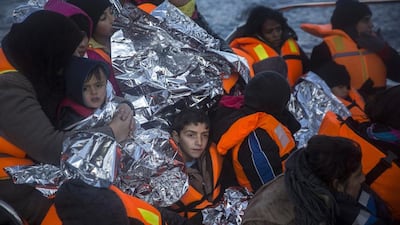Europe's border security agency Frontex was complicit in an illegal operation to stop asylum seekers crossing the Aegean Sea by boat from Turkey to Greece, according to an investigation by a media consortium.
A video from June 8 showed a Frontex vessel blocking a small refugee boat north-east of the Greek island of Lesbos before it returned to Turkish waters where 47 people were picked up. The vessel also appeared to pass dangerously close to the dinghy, creating a wave, according to the investigation.
Experts said the incident - known as a ‘pushback’ - appeared to be illegal and violated a ban on the forcible return of refugees or asylum seekers to countries where they could face persecution. The tactic sometimes involves boats blocking dinghies until they run out of fuel and are pushed back into Turkish territorial waters.
The incident was one of six cited by the group where Frontex should have been aware that Greek officials were involved in pushing back refugees, said the group, which included Germany's Der Spiegel. It said the June 8 incident was the only one where Frontex was actively involved.
Dana Schmalz, an international law expert at the Max Planck Institute in Heidelberg, told investigative journalism website Bellingcat, that if Frontex did not pick up the migrants and "then let the Greeks do the dirty work – then they are involved in the illegal pushback".
German public broadcaster ARD, journalist collective Lighthouse Reports, and Japanese broadcaster TV Asahi were involved in the investigation alongside Der Spiegel and Bellingcat. The journalists say they compared "dozens" of videos, also checking satellite imagery and eyewitness accounts from both refugees and Frontex workers.
Der Spiegel said that more than 600 people from the European border agency equipped with boats, drones and aircraft are deployed in Greece, where many migrants first enter the EU.
It added that Frontex would not comment on the individual cases uncovered by the investigation, but referred to a human rights and code of conduct supposed to bind staff.
The agency posted on Twitter on Friday that its actions in support of the Greek authorities were "in full respect of fundamental rights and international law," adding that it "has been in contact with the Greek authorities about some incidents at sea in recent months".
Athens had launched an "internal inquiry," it added.
Greece's conservative government has always rejected claims of illegal pushbacks taking place at its borders, regularly alleged by several charities.
“Our country protects its borders with an absolute respect for international law,” Greek Immigration Minister Notis Mitarakis said on Saturday.
The investigation followed controversy earlier this year involving Greek guards at the land border with Turkey. A Pakistani migrant was fatally shot at the border in March when thousands of people were barred entry to the European Union.
The dead man, identified as Muhammad Gulzar, was one of seven people shot during chaotic scenes after Greek soldiers, backed by the European Union, used tear gas to repel the migrants from a border fence between the two countries.
Athens initially claimed the fatal shooting was "fake news" invented by the Turkish authorities, but an investigation by Bellingcat and other groups concluded that Greek soldiers probably fired the fatal shot.
The government of Recep Tayyip Erdogan orchestrated the mass movement after opening its borders on February 27 and bussing migrants to areas close to the border.


